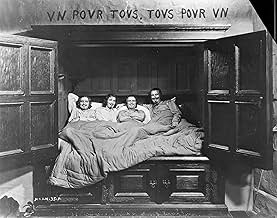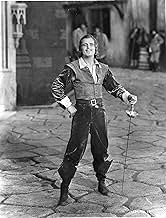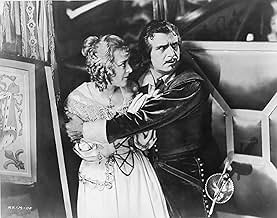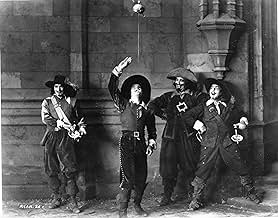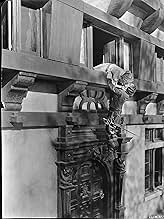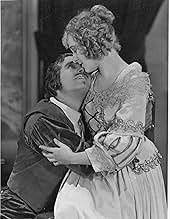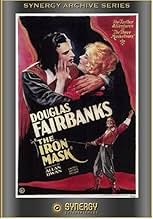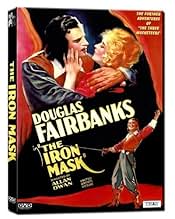Füge eine Handlung in deiner Sprache hinzuKing Louis XIII of France is thrilled when his son is born--an heir to the throne. But his Queen has actually delivered twin boys. Cardinal Richelieu sees the second son as a potential for r... Alles lesenKing Louis XIII of France is thrilled when his son is born--an heir to the throne. But his Queen has actually delivered twin boys. Cardinal Richelieu sees the second son as a potential for revolution, and has him sent off to Spain to be raised in secret to ensure a peaceful futur... Alles lesenKing Louis XIII of France is thrilled when his son is born--an heir to the throne. But his Queen has actually delivered twin boys. Cardinal Richelieu sees the second son as a potential for revolution, and has him sent off to Spain to be raised in secret to ensure a peaceful future for France. Alas, keeping the secret means sending Constance, lover of D'Artagnan, off t... Alles lesen
- Auszeichnungen
- 2 wins total
- Porthos
- (as Stanley Sandford)
- Undetermined Secondary Role
- (Nicht genannt)
- DeRochefort's Ruffian
- (Nicht genannt)
Empfohlene Bewertungen
The old-fashioned style of filming works pretty well for this kind of story, Fairbanks is in his element, and he gets good support from the rest of the cast as well. This is a fun feature for anyone who likes silent films.
I am currently watching it (17 June 2012) on Rock Valley College's public access channel. I have seen three different versions of this story. Each has its own variations of the storyline. I like this one, maybe because I am partial to silent films. The story depends on action more than inane chatter.
Douglas Fairbanks, silent cinema's greatest swashbuckling hero, bid farewell to the glory days of the silent screen with this joyous romp of a film. As a sequel to Fairbanks' earlier THE THREE MUSKETEERS (1921), it more than surpasses its predecessor in lavish production values, good acting & nonstop action.
Now 46, Fairbanks seems none the worse for wear and his muscular athleticism is still called upon to win the girl, beat the foe & thrill the audience. Fairbanks had a natural spontaneity & authentic joie de vivre, both in his private life and in his screen persona, which audiences of the 1920's found absolutely irresistible. He was unique - unforgettable - utterly irreplaceable.
Fairbanks is supported once again by a fine cast: lovely Marguerite De La Motte as the faithful Constance; Dorothy Revier as the treacherous Milady de Winter; William Bakewell in the dual role of the two princes; Lon Poff as the sinister Father Joseph. That's the excellent character actress Vera Lewis in the tiny role of the Royal Midwife.
The Three Musketeers themselves are rather more finely delineated than in the previous film. Léon Bary as Athos, Tiny Sandford as Porthos & Gino Corrado as Aramis all give good account of themselves throughout the flurry & turmoil of the lively plot.
Special mention must be made of British actor Nigel de Brulier, once again playing the rapacious Cardinal Richelieu. Even though the character disappears half way into the film, de Brulier still manages to invest the Churchman with more than just villainy. He helps the viewer to glimpse the real person behind the facade and to understand some of the reasons for his tyrannical behavior.
One of the versions in which this film is available has all the title cards removed & a rousing narrative read by Douglas Fairbanks Jr. substituted in their place.
**************************
The opening credits state that the film's narrative was based on the story by Elton Thomas (a pseudonym for Fairbanks), which was in turn based on Alexander Dumas' The Three Musketeers' & Twenty Years After.' This is true, but all of the Man in the Iron Mask elements actually came from Dumas' novel Ten Years Later; or, The Vicomte de Bragelonne,' (1848-50). Thus, the events in the latter half of THE IRON MASK take place 30 years after the events in THE THREE MUSKETEERS.
The first film is set in 1625; the second film starts in 1638. Since important plot elements are not handled in THE THREE MUSKETEERS - for instance, Milady's evil behavior towards Constance - they are somewhat incongruously left dangling for 13 years until the beginning of THE IRON MASK. And some of the most fascinating elements of the later books - such as the Musketeers' clash with Milady's malevolent son & the machinations of Richelieu's successor, the wily Cardinal Mazarin - are completely ignored altogether.
But this is a mere quibble and should not detract from the immense enjoyment of a very fine film. It might be helpful to note, in passing, a few historical dates which deal directly with the plot:
Louis XIV born September 15, 1638.
Cardinal Richelieu dies December 4, 1642.
Louis XIII dies May 14, 1643.
Louis XIV is crowned King in 1654, after attaining maturity.
Those familiar with the plot, which was remade several times on screen and television, including THE MAN IN THE IRON MASK (United Artists, 1939) with Louis Hayward, and/ or the most recent and satisfactory 1998 featuring Leonardo DiCaprio and Jeremy Irons, will find the story here not much different, but only shorter in its basic format, as is with its title. The story begins with King Louis XIII of France (Rolfe Sedan) receiving the news of the birth of his son, the future heir to the throne. The only problem is that the heir also has a twin. Since there cannot be two heirs, this news must be kept in utmost secrecy and anyone involved must be put away forever. Constance Beaucieux (Marguerite De La Motte), D'Artagnan's (Douglas Fairbanks), beloved, who was the midwife during the birth, is immediately put away in the Convent of Martes by orders of Count De Rochefort (Ullrich Haupt). Unaware of the secret, D'Artagnan tries to rescue Constance from being held prisoner against her will, but arrives too late. She has been stabbed by Milady De Winter (Dorothy Revier) after discovering the secret mark on her shoulder, the brand of a common criminal. Before Constance dies in D'Artagnan's arms, she utters her final words to him, "the other one ..." The death of Constance leaves D'Artagnan feeling empty and bitter. D'Artagnan, who has been reunited with his colleagues, The Three Musketeers, later saves them from being executed by orders of the Cardinal Richelieu (Nigel De Brulier). After D'Artagnan rescues Richelieu from De Rochefort's men, the Musketeers are pardoned, but find they must part company once more when D'Artagnan is appointed as guardian to the newborn infant and sent to Spain while the actual heir to the throne remains in France. Some twenty years later, the evil twin brother (William Bakewell), a spoiled young man, eventually learns his true identity and of his twin brother holding the throne in France from the villainous De Rochefort. The evil twin plots to take over the throne by having his brother abducted, and banishing him by having him locked in a dungeon with his face sealed in an iron mask for all eternity, and being given food from the guards from under the door, and with strict orders for him not to ever have any visitors. While taking control of the throne, the evil twin meets with his mother, Queen Anne (Belle Bennett), who immediately realizes what's happening. It is then up to the D'Artagnan and his musketeers, now older men, to reunite and save the day.
Featured in the supporting cast are Stanley Sanford as Porthos; Leon Bary as Athos; Gino Corrado as Aramis; Vera Lewis as Madame Peronne and Gordon Thorpe playing the boy prince and his evil twin.
A satisfactory version that becomes a bit slow going at times due to a couple of flashbacks, but then picks up speed again with a memorable swashbuckling conclusion. THE IRON MASK was first introduced as part of the 12-week series on public television's THE SILENT YEARS (1975), hosted by Lillian Gish. Because this was Fairbanks' final silent adventure, released the final year of the silent era (1929), THE IRON MASK became the film chosen as the closing chapter to this series. Accompanied with an original piano score by William J. Perry, from the Paul Killiam collection, and running at the length of about 87 minutes, THE IRON MASK also consisted of color tinted scenes. Reportedly distributed theatrically with talking sequences, sound effects and an original musical score (which may still exist today), THE IRON MASK was later reissued in 1952 through Odyssey Pictures, eliminating the original title cards, replaced with narration by Douglas Fairbanks Jr., and accompanied by a new orchestral score. Available with the excellent Perry piano score on video cassette through Blackhawk Films in the 1980s, current video copies distributed in the 1990s present THE IRON MASK with its 1952 72 minute reissue format, the version which formerly aired on American Movie Classics from 1997-1998. Although the difference being the length and clearer picture quality, with the narration giving a better outlook and understanding to the storyline, silent film buffs would prefer to see THE IRON MASK restored to its original silent format. Thanks to KINO video, it's own copy has been restored with sound prologue with Doug Fairbanks himself as well as an orchestral score by Carl Davis. HO-LA! (***)
Wusstest du schon
- WissenswertesIn the prologue the four musketeers stand in a framing device, as a medieval stage booth, and D'Artagnan steps forward and speaks to the audience, then steps back and resumes his position with the other three, who remained motionless; after the mid-point intermission, the same situation is repeated, with D'Artagnan speaking again to the audience, finishing with the words, "once more, once more . . . ", after which the film resumes with the title card "20 years later". These were the first lines of dialogue ever spoken on film by Douglas Fairbanks, in his last silent film.
- PatzerThe iron-masked King languishes in his tower prison and notices a fisherman in the sea below. He quickly scratches a message on a pewter platter and tosses it out of the window to the rocks below. The fisherman picks up the place and READS the message - at that time in history the (oppressed) French working class were illiterate.
- Alternative VersionenThe 1999 restored version (near 104 minutes) by Kino Video, has the original speeches by d'Artagnan, the title cards, but a new musical score by Carl Davis, played by the City of Prague Philharmonica Orchestra. The restored version is distributed by Kino Video and Photoplay Productions.
- VerbindungenFeatured in Hollywood - Geschichten aus der Stummfilmzeit (1980)
- SoundtracksOne for All, All for One
(1929) (uncredited)
Lyrics by Jo Trent
Music by Hugo Riesenfeld and Louis Alter
Top-Auswahl
- How long is The Iron Mask?Powered by Alexa
Details
Box Office
- Bruttoertrag in den USA und Kanada
- 3.270.000 $
- Laufzeit1 Stunde 45 Minuten
- Sound-Mix
Zu dieser Seite beitragen


